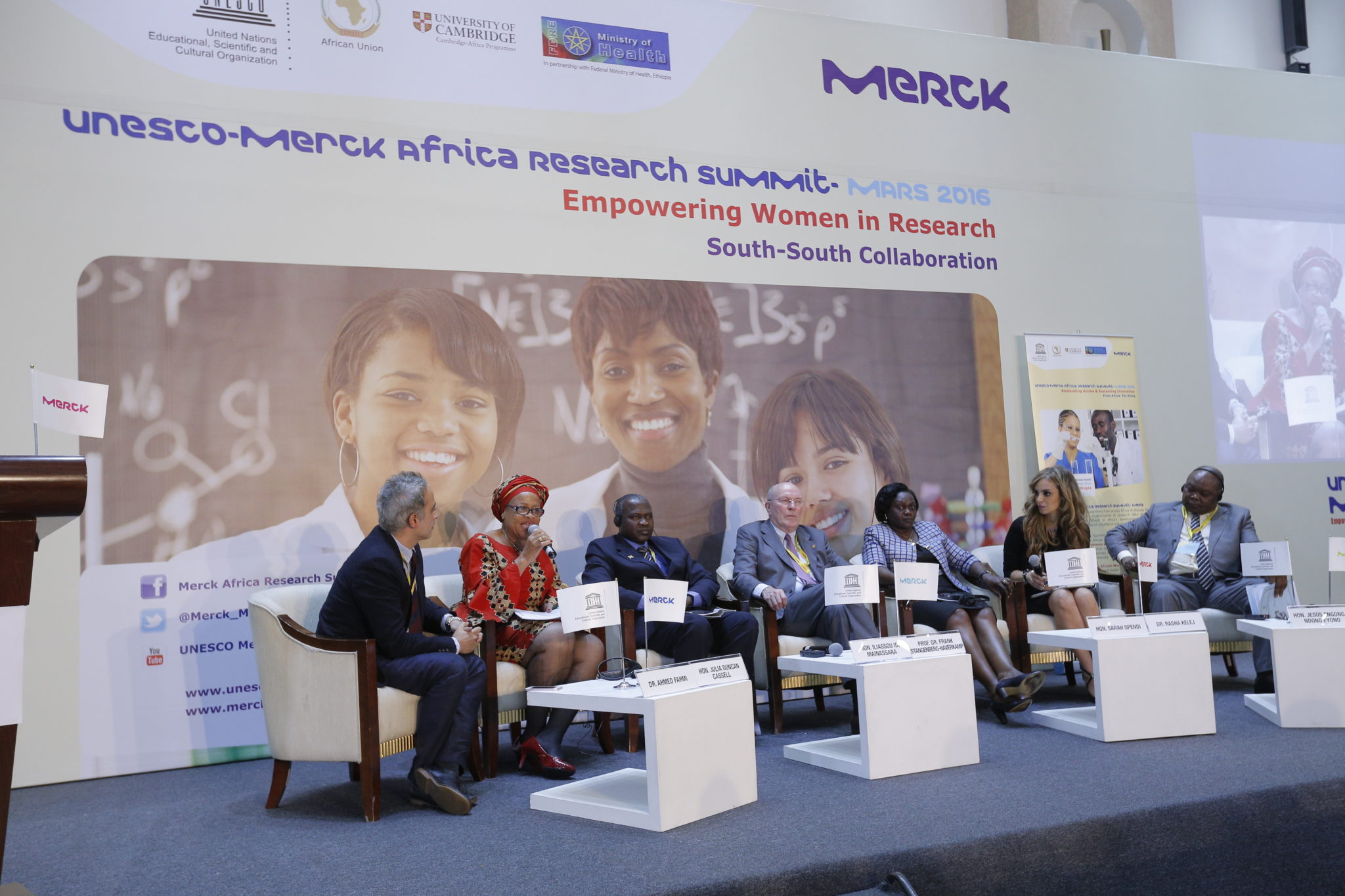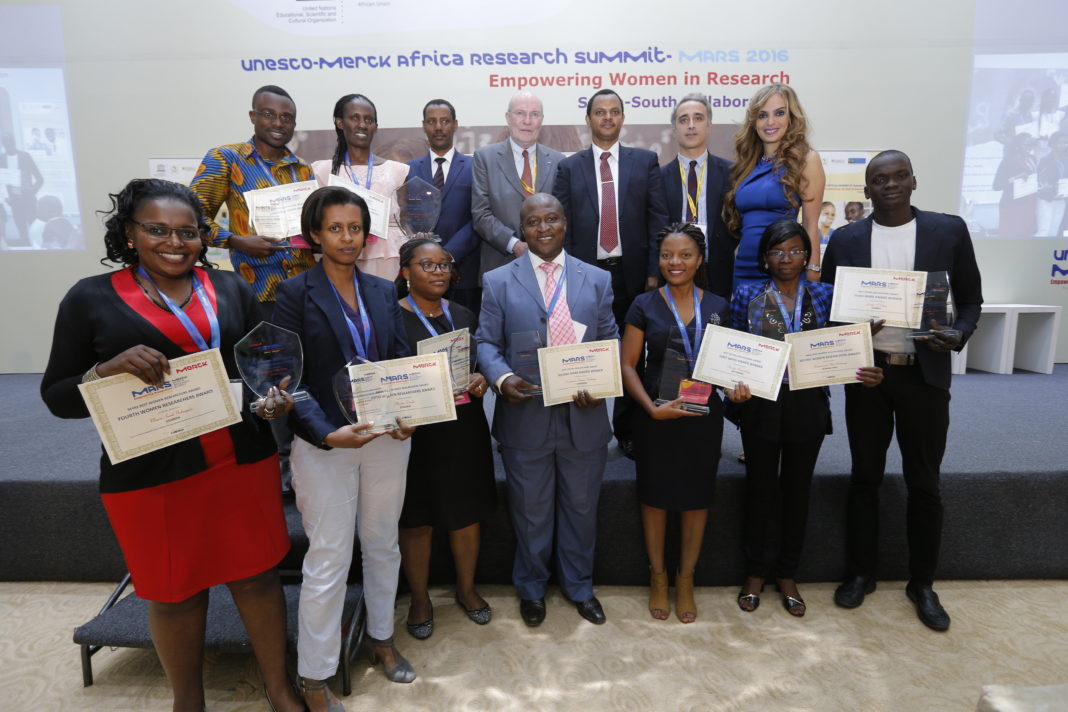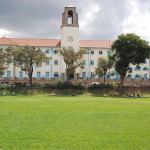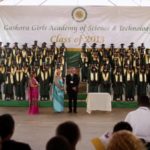Ugandan scientist Maria Nabaggala is one of the five best African women researchers on cancer related to women health, an undertaking related to bridging the gap of gender inequality in Science, Technology, Engineering and Mathematics (STEM) on the continent.

Nabaggala of the Infectious Diseases Institute (IDI) emerged 4th in the ‘Best African Women Researchers Award’ category for her study on ‘understanding the outcomes of HIV positive patient tracking following a missed appointment in rural Uganda’.
The competition was sponsored by Merck Africa, and the four other winners of the presitigious award include Beatrice Nyagol of the Kenya Medical Research Institute; Rogomenoma Ouedraogo, of the Laboratory of Biology and Molecular Genetics, University of Ouagadougou; Sandrine Liabagui ep Assangaboua Ecole Doctorale Regionale d’Afrique Centrale, Franceville and Ethiopian Martha Zewdie, Armauer Hansen Research Institute.
Merck announced the five winners under the category of ‘Best African Women Researchers Award’ alongside four other winners from Botswana, Cameroon, Gambia and Zimbabwe for the ‘Best Young African Researchers Award’ during the recently held 2nd UNESCO-Merck Africa Research Summit in Addis Ababa, Ethiopia where the first ‘Best African Women Researchers Award’ was being launched.
The recipients of the awards are PhD students and young investigators based at African research institutes and universities and were selected based on the abstracts they submitted. These impressive abstracts were related to Infectious Diseases with the aim to improve Women Health, the focus of UNESCO-MARS 2016.

‘Following the success of Merck Cancer Access Program to empower women in oncology field where they are underrepresented, comes another successful initiative for MERCK to empower African women in research to offer better health care to women,’ a release by Africa Press Organisation (APO) states in part.
The awards are linked to Professor Frank Stangenberg-Haverkamp, the Chairman of Executive Board and Family Board of E. Merck KG and a recipient of the ‘African Alliances HE for SHE’ award for women empowerment.
“Merck will work together with UNESCO to empower young researchers which raises the level of scientific research in Africa and encourages in particular young women researchers to pursue their dreams, work for improving access to health solutions and make a difference in the continent. Moreover, I am very pleased to offer my support to motivate female researchers and healthcare providers and recognize their excellent contribution to fields where they are underrepresented,” Prof. Stangenberg-Haverkamp told the awardees.

In her introductory remarks, Dr Rasha Kelej, Chief Social Officer, Merck Healthcare highlighted: “This is the second UNESCO-MARS we are holding after the successful one held in Geneva, Switzerland in 2015. Merck is committed to empowering women in STEM (Science, Technology, Engineering and Mathematics) which will consequently contribute to improving the quality of research and science in Africa.”
“Merck’s support for research and healthcare especially in the field of oncology where women are currently under-represented will help bridge the gender gap in STEM in Africa. Merck have provided earlier this year Oncology fellowship program to African women doctors from Kenya, Uganda, Ghana and Tanzania. Not only that we have also supported women cancer survivors through access to information, awareness about prevention and early detection, health and economic empowerment through Merck more than a a patient initiative which focuses mainly on Cancer in women and its social misperception and stigma,” Rasha Kelej added.
Merck will provide the winners with training and mentorship opportunity to advance their capacity and helps bring them to the international standard. The winner of MARS Research awards will be appointed as Merck Ambassadors of Empowering Women and Girls in STEM in their own countries through several future initiatives to be announced in 2017.
‘Best African Women Researchers Award’ winners:
1st winner: Kenya
Beatrice Nyagol, Kenya Medical Research Institute for her study on: “Clinicians’ experiences and insights in conducting an intra-vaginal ring study among young women in Kisumu, Kenya, 2015 -Lessons learned” (see the video section: UNESCO-MARS 2016 ‘Best African Woman Researcher Award’ 1st place winner, Beatrice Nyagol, Kenya)
2nd winner: Burkina Faso
Rogomenoma Ouedraogo, Laboratory of Biology and Molecular Genetics University of Ouagadougou for her study on: “Molecular diagnosis of cytomegalovirus (CMV), the human herpes virus type 6 (HHV6) and Epstein-Barr virus (EBV) by real-time PCR in pregnant women infected or not infected by HIV at Ouagadougou, Burkina Faso” (see the video section: UNESCO-MARS 2016 ‘Best African Woman Researcher Award’ 2nd place winner, Alice Rogomenoma)
3rd winner: Gabon
Sandrine Liabagui ep Assangaboua Ecole Doctorale Regionale d’Afrique Centrale, Franceville for her study on: “Pro- and anti-inflammatory cytokines in children with malaria in Franceville, Gabon”
4th winner: Uganda
Maria Nabaggala, from the Infectious Diseases Institute for her study on: “Understanding outcomes of HIV positive patient tracking following a missed appointment in rural Uganda”
5th winner: Ethiopia
Martha Zewdie, Armauer Hansen Research Institute for her study on: “Ex-vivo characterization of regulatory T-cells in pulmonary tuberculosis patients, latently infected persons, and healthy endemic controls” (see the video section: UNESCO-MARS 2016 ‘Best African Women Researcher Award’ 5th place winner, Martha Zewdie, Ethiopia)
‘Best Young African Researchers Award’
The three categories of the ‘Best Young Researchers Award’ were given to two female and two male researchers from Botswana, Cameroon, Gambia and Zimbabwe.
1st winner: Botswana
Patricia Rantshabeng, University of Botswana for her study on: “Prevalence of oncogenic Human Papillomavirus genotypes in women with vulvar and cervical squamous cell carcinoma in Botswana (see the video section: UNESCO-MARS 2016 ‘Best Young African Researcher Award’ 1st place winner, Patricia Rantshabeng, Botswana)
2nd winner: Cameroon
Constantine Asahngwa, Cameroon Centre for Evidence Based Health Care for his study on: “The experiences of women living with trachoma in Africa: A qualitative systematic review” (see the video section: UNESCO-MARS 2016 ‘Best Young African Researcher Award’ 2nd place, Constantine Asahngwa, Cameroon)
3rd winner: Zimbabwe
Tinashe Nyazika, University of Zimbabwe for his study on: “Cryptococcus neoformans population diversity is not associated with clinical outcomes of HIV-associated cryptococcal meningitis patients in Zimbabwe” (see the video section: UNESCO-MARS 2016 ‘Best Young Researcher Award’ 3rd place winner, Tinashe Nyazika, Zimbabwe)
3rd winner: Gambia
Lamin Cham, from National Aids Control Program for his study on: ‘Qualitative detection of proviral-DNA of HIV-1 in neonates to determine the efficacy of antiretroviral therapy in the prevention of vertical transmission of HIV-1 in the Gambia’.







